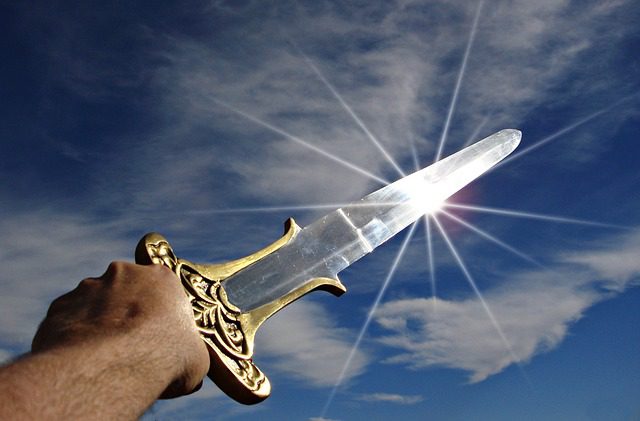
- Image: Pixabay
In the dialog between Christians about whether or not following Jesus entails embracing a non-violent lifestyle, there are certain verses in the New Testament that have to be addressed.
**
For example, whenever non-violent Christians quote Jesus saying, “Put your sword back in its place…for all who draw the sword will die by the sword.” (Matthew 26: 52), there are pro-war Christians who will respond by saying, “(Jesus) said to them, ‘But now let the one who has a moneybag take it, and likewise a knapsack. And let the one who has no sword sell his cloak and buy one.’” (Luke 22:36)
**
In other words, some Christians believe that Jesus fully endorsed owning and using weapons for self-defense (or for use in war), and other Christians believe that Jesus categorically prohibited His followers from using violence. What’s the real story?
**
Well, those verses where Jesus forbid violence are numerous and they are not difficult to understand. In addition to the one quoted above, we also hear Jesus declare that we should love our enemies, do good to those who hate us, turn the other cheek, and forgive those who seek to harm us. These are not figurative passages and taken together they paint (in my mind at least) a pretty straightforward picture of Jesus’ expectation that his disciples would not do violence.
**
In addition to Jesus’ commands we also have His example of forgiving those who crucified him, healing the ear of the soldier who came to arrest him in the Garden, restraining the Legions of angel soldiers at his command, and telling Pontius Pilate that his Kingdom was not of this Earth, and if it was his disciples would fight, begging the question, “If His disciples do fight then are they not part of Christ’s Kingdom”? (see John 18:36)
**
But this one verse where Jesus tells his disciples to go out and buy a sword is right there in the Bible, isn’t it? What’s it there for? If Jesus didn’t intend for us to own or use swords then why did he say this? Especially if, later on, he was going to contradict himself and rebuke Peter for using the sword he told him to go out and buy?
**
Well, here’s what I think is going on. First of all we need to look closely at this passage in Luke. Notice that right after Jesus tells his disciples to buy a sword he goes on to say, “For I tell you that this Scripture must be fulfilled in me: ‘And he was numbered with the transgressors.’ For what is written about me has its fulfillment.” And they said, “Look, Lord, here are two swords.” And he said to them, “It is enough.” (Luke 22:36-38 ESV)
**
Right away we can see that Jesus’ statement about the swords is directly related to prophecy (“…this Scripture must be fulfilled in me”) and what is the prophecy that must be fulfilled? The one in Isaiah that says, “And he was numbered with the transgressors”.
**
Was the statement about buying a sword about self-defense? Probably not. Why? Because first of all, two swords are not “enough” to defend 13 guys against a legion of Roman soldiers. Also, because when Peter uses his sword in self-defense (or to protect Jesus from the soldiers) he is harshly rebuked with the verse we’ve already looked at, “Put it away! Those who live by the sword shall die by the sword”.
**
Clearly, Jesus is not a fan of self-defense here. At least, not according to the overall context in this passage. However, he does tell the disciples that he wants them to have those two swords with them so that the prophecy about the Messiah being numbered with the transgressors may be fulfilled in Him. That’s why two swords are “enough” for Jesus; to fulfill the scriptures, not to endorse war or physical violence.
**
Are we sure that Jesus only meant this in light of fulfilling the prophecies about Himself? Yes. How? Because after Peter cuts off the soldiers ear, listen to what Jesus has to say, “Do you think I cannot call on my Father, and he will at once put at my disposal more than twelve legions of angels? But how then would the Scriptures be fulfilled that say it must happen in this way?” (Matthew 26:53-54)
**
See? Jesus tells them to get a few swords so that the prophecy in Isaiah will be fulfilled. Then, once it’s fulfilled in the Garden he makes a point of saying that this is what he had in mind in the first place. So, it’s all about fulfilling the prophecies, not a statement from Jesus endorsing violence.
**
As sincere followers of Jesus we must take into account all the many other teachings of Jesus regarding turning the other cheek, loving our enemies, and not resisting an evil man. We must also be careful to interpret the Old Testament scriptures in light of Jesus, not the other way around (i.e. – trying to fit Jesus into the Old Testament context).
**
Jesus came to fulfill the Old Covenant, and He accomplished this in full. The Old Covenant is obsolete. (see Hebrews 8:13) We don’t need to refer back to it again when it comes to guiding our daily lives. We have Christ. We have the Living Word of God who has come to make His home in us. Jesus gave us a New Covenant and He lived a better example for us to follow.
**
“Jesus said, “Love your enemies, do good to those who hate you, bless those who curse you, pray for those who mistreat you.” (Luke 6.27-28)
**
-kg
**
Keith Giles is the author of several books, including the Amazon best-seller “Jesus Untangled: Crucifying Our Politics To Pledge Allegiance To The Lamb.” He’s also the co-host of The Heretic Happy Hour Podcast on iTunes and Podbean.













